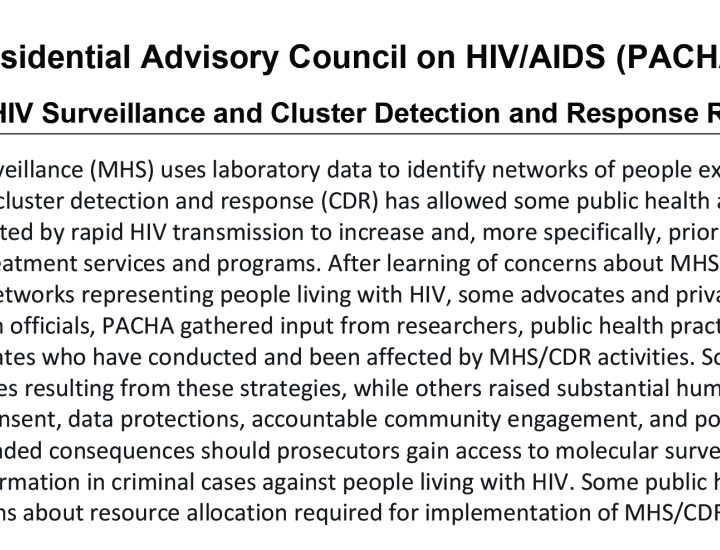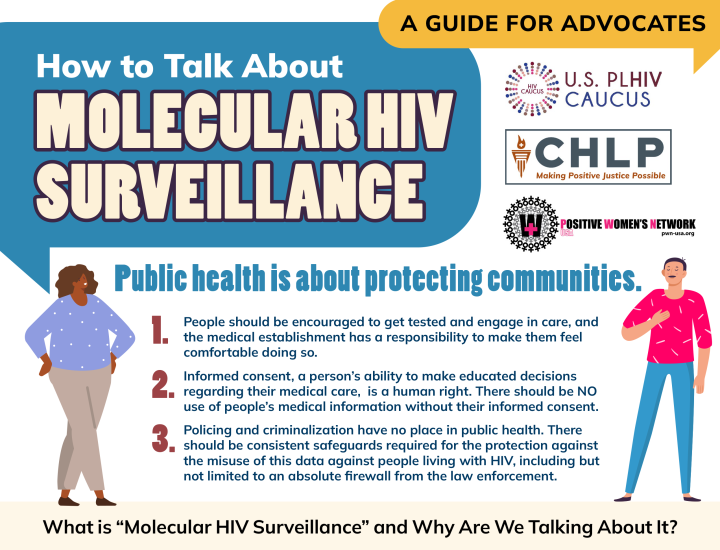CHLP Statement Regarding PACHA Resolution on Molecular HIV Surveillance

PACHA Recommends Opt-Out Options, Local Adaptations of Molecular HIV Surveillance But More Action Still Needed
Advocates will push for implementation of Presidential Advisory Council on HIV/AIDS (PACHA) Recommendations to the CDC, but with caveats
by Amir Sadeghi and S. Mandisa Moore-O’Neal
October 20, 2022
For years, CHLP has been a proud and leading member of a growing group of advocates who have been pushing back on the implementation of molecular HIV surveillance (MHS). Focusing on those already diagnosed and in care, MHS refers to the set of tools and activities public health professionals are using to compare and analyze individual HIV treatment resistance data and track disease transmission across a state or local jurisdiction. This invasive strategy not only uses individual health information of people living with HIV (PLHIV) without their knowledge but is intended to do targeted prevention following “outbreaks” of infection – which is an inadequate substitute for a wholly inclusive prevention strategy that expands sexual health literacy and care to our communities that we already know are at particular risk. In fact, numerous advocacy organizations, coalitions, networks of PLHIV, public health leaders, and legal experts raised the alarm about potential harms associated with MHS once it was announced as a mandatory component of HIV prevention funding by the Centers for Disease Control and Prevention (CDC) in 2018.
Most of CHLP’s advocacy against MHS, and that of our partners, has targeted federal officials at the CDC, HHS, and the Office of National AIDS Policy, but we also have been leading efforts to engage members of our community – through AIDS United’s Public Policy Committee and an MHS advocacy group coordinated by PWN-USA – in better understanding the entire landscape and the true costs of MHS.
In 2019, CHLP published a fact sheet, “Is HIV Molecular Surveillance Worth The Risk?” along with a companion webinar featuring US People Living with HIV Caucus Chair Ronald Johnson and New Mexico Department of Health HIV, STD, and Hepatitis Section Manager Andrew Gans. In 2020, CHLP participated in an MHS ad hoc committee of the AIDS United Public Policy Council (PPC), which released its position statement on the use of MHS to track HIV transmission networks. We continue to work within the PPC to elevate this issue. Most recently, we have engaged with the Presidential Advisory Council on HIV/AIDS (PACHA) and worked with our partners on proposals that, to some extent, are reflected in PACHA’s recent set of recommendations to the CDC.
On Monday, October 17, 2022, PACHA voted unanimously in favor of a resolution drafted by its Stigma and Disparities Subcommittee. The Subcommittee relied on a workgroup organized by its Co-Chair Justin Smith and PACHA Co-Chair Marlene McNeese to develop the recommendations. CHLP’s National Policy and Partner Strategist Amir Sadeghi joined the May 9-10, 2022 workgroup to frame the national legal and policy landscape that intersects with community concerns around MHS. The workgroup included PLHIV, academics, clinicians, researchers, health departments, advocates, and federal partners invited to share their expertise and assist PACHA in drafting the recommendations. While the PACHA resolution represents an earnest effort in response to widespread concern about molecular HIV surveillance, more direct action and transparency from state, local, and federal public health agencies is needed.
In the October 17 resolution, PACHA urges the CDC to update its guidance to state, territorial, and local health departments and public health departments to collaborate with key stakeholders and PLHIV and assess whether MHS should be implemented locally, as well as how MHS activities might be constituted to ensure PLHIV are not harmed. PACHA recommends that local adaptations of MHS must be responsive to the needs within a given jurisdiction based on reviews of state and local laws used to criminalize PLHIV, including general criminal laws, the legal environment of public health data protections, and tribal data sovereignty. According to the resolution, “acceptable local adaptations of MHS should span from full implementation of MHS strategies and activities to a jurisdiction-wide moratorium on all MHS activities until safeguards are implemented and the human rights concerns of people living with HIV are addressed.”
PACHA also recommends that plain-language notifications be available to PLHIV about the types of surveillance being conducted as well as provide options for patients to opt out from the use of their MHS data in the CDC’s “cluster detection and response” (CDR) activities. PACHA also advises the CDC to:
Provide federal funds to jurisdictions conducting MHS to establish Community Advisory Boards (CAB), made of a majority of PLHIV, focused on MHS/CDR, and to share feedback on its implementation.
Fund technical assistance for evaluating the effectiveness of MHS activities compared to traditional approaches to HIV surveillance and prevention.
Partner with local health departments on a national clearinghouse of MHS/CDR information, including documentation of community concerns and cost-benefit analyses.
Fund academic detailing for providers on better explaining MHS/CDR to patients, training on best practices regarding informed consent, and information for patients about opting out of data sharing.
Work with partners, states, community members, and PLHIV to create a stronger system of informed consent on the uses of MHS data.
Partner with the Department of Health and Human Services, White House Office of National AIDS Policy, Health Resources and Services Administration, National Institutes of Health, Substance Abuse and Mental Health Services Administration, and the federal Indian Health Service agency to work with states and educate lawmakers and prosecutors about HIV literacy and urge them to review their state’s HIV criminal laws.
CHLP has called on the CDC and other federal stakeholders to suspend issuing further MHS-related funding announcements until concrete, written protections are in place to ensure public health surveillance information can never be weaponized against PLHIV, as well as offer the option for PLHIV to opt out at every stage of data sharing across jurisdictions. In addition to these protections, CHLP questions the band-aid approach of MHS as a prevention tool. At a moment when PrEP programs are facing closure because of divestment and just as PrEP is more readily available to Black and Brown communities, is this the best use of our public health dollars? When state health officials say they don’t have the resources to address the epidemics of STIs and sexual health illiteracy, is investing even more money in MHS, including grants to academics and advisory groups, what we really need? What is the justification for continued investment in this costly technology?
Knowing that our communities are already targeted and increasingly policed because of their race, gender, class status, and sexuality and that this is the context in which PLHIV are further criminalized, we question the framework used when determining the composition of these Community Advisory Boards. What guidelines are in place to ensure PLHIV from already-policed communities (meaning people most likely to be confronted, arrested, and prosecuted for their status) will be represented? And what guidelines will ensure that the representation is purposeful, authentic, and not from a place of tokenization? Furthermore, when so much of MHS happens privately, between a patient and their providers, is oversight even possible?
Instead, this is a moment to assess what other jurisdictions have done to limit MHS and the impacts, if any, on prevention. For example, in September, Washington, DC passed a local law limiting when the DC Department of Health can release HIV-related records, including MHS data, and prohibited their use in civil or criminal proceedings unless the person to whom the information belongs provides written consent. What can the CDC and other federal stakeholders learn from this jurisdiction that can inform a national strategy?
Whether the CDC accepts and carries out PACHA’s recommendations remains to be seen. CHLP will be joining other national networks and organizations to actively monitor the federal and state-level work to come including whether and how CDC will implement these recommendations.
Read the full PACHA resolution, submit a written statement and take action now using this helpful tool.
##
CHLP fights stigma and discrimination at the intersection of HIV, race, health status, disability, class, sexuality and gender identity and expression, with a focus on criminal and public health systems. As part of this work, we support movement building that amplifies the power of individuals and communities to mobilize for change rooted in racial, gender and economic justice. We do this through legal advocacy, high-impact policy initiatives, and creation of cross-issue partnerships, networks, and resources.

